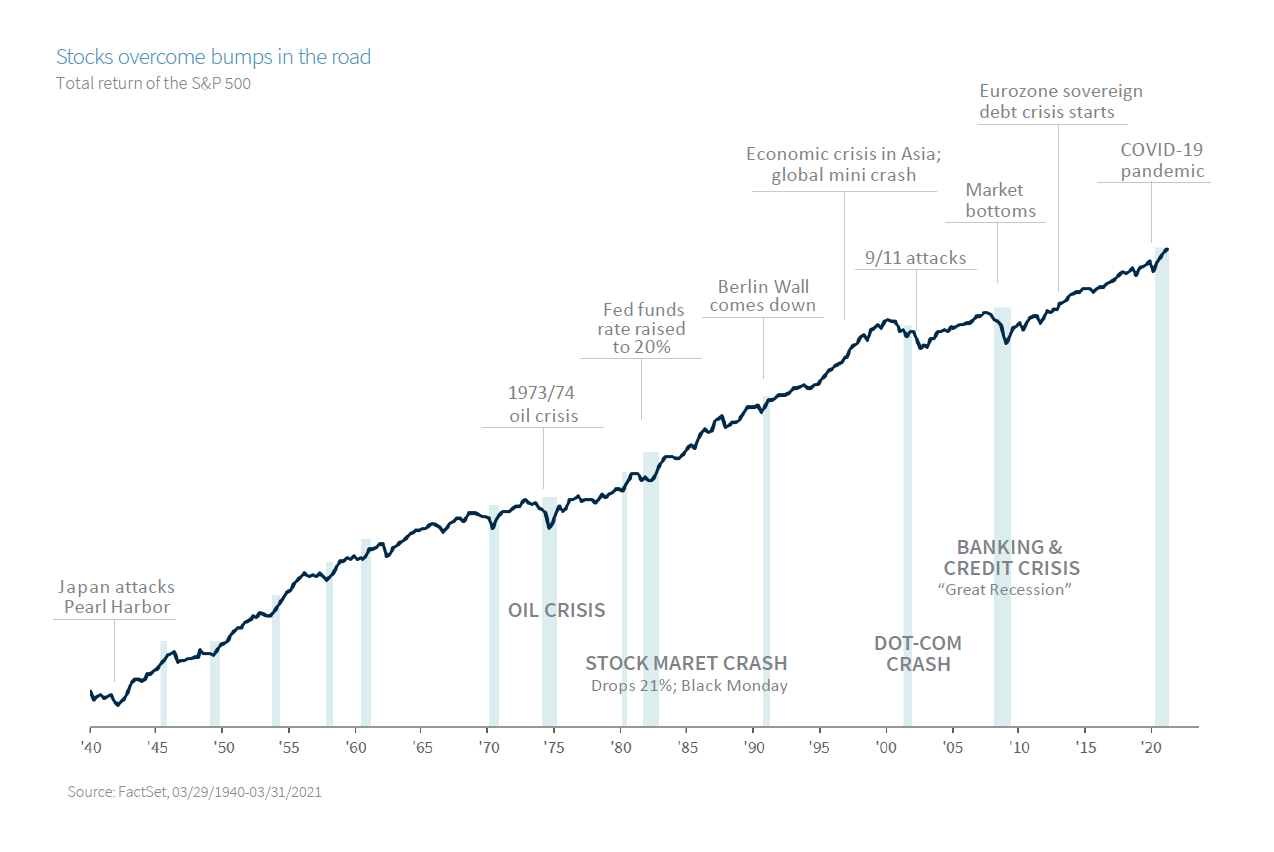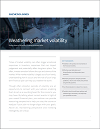Over Time, Markets Have Proved Positive and Resilient
When markets react, consider a broader historical perspective before changing your financial course.
Market volatility can often trigger emotional responses in investors, responses that can impact judgement and potentially affect long-term plans.
These periods of volatility are an opportunity to connect with your advisor, enabling them to act as a sounding board for your concerns. By talking about current events in light of your overall financial plan, your advisor can provide reassuring perspective to help you stay the course or readjust if needed.
Pullbacks throughout history
Pullbacks can make you want to pull up stakes and run – a reaction that’s often a mistake, especially for long-term investors. The right knowledge and historical perspective can help us avoid making investment decisions based on emotion rather than strategy.
By looking at the market over a long period of time, we’re provided with a true testament of resiliency. Each decline along the way felt terrible, and declines today feel just as uncomfortable. But when we track the overall growth the market has achieved, it’s clear that there are benefits to persistence, patience and commitment.
Remember:
- The stock market is cyclical.
- You will likely encounter numerous pullbacks and/or corrections as a long-term investor.
- A study of the stock market shows its resilience.
- In the long run, the upturns have always been stronger than the downturns.
Stocks overcome bumps in the road
Total return of the S&P 500

Source: FactSet, 3/29/1940-3/31/2021
Staying invested through volatile times
Timing the market is a near-impossible task. By staying invested, even through periods of volatility, investors can increase their chances of achieving higher returns.
Take a look at the chart below illustrating how missing even a few market days can impact overall returns. Over the past 15 years, the S&P 500 has grown at an annualized rate of 7.5%. However, removing only the five best trading days over that 15-year period would bring the index’s total growth down to 4.7%, and missing the 20 best trading days pulls its return into negative territory.
Don’t inadvertently miss out on important recovery days by trying to time the market’s every movement. Instead, speak with your advisor about how your long-term plan is positioned to weather short-term volatility – and discuss whether temporary pullbacks are actually an opportunity to strategically add to your portfolio.
Remember:
- Generally, returns have been less volatile over longer holding periods.
- Returns over time have been positive in most cases.
- Even a few strong market days can significantly impact total returns.
- Dollar-cost averaging can help take advantage of volatility.

Source: FactSet, as of 12/31/2020
Especially during declines, your advisor can act as a sounding board for your concerns. By talking about current events in light of your overall financial plan, your advisor can help provide reassuring perspective to help you stay the course and take advantage of any opportunities that tumultuous markets can present.
 Read the fullWeathering Market Volatility brochure
Read the fullWeathering Market Volatility brochure
Past performance may not be indicative of future results. There is no assurance these trends will continue. The market value of securities fluctuates and you may incur a profit or a loss. Investing involves risk including the possible loss of capital. This analysis does not include transaction costs which would reduce an investor’s return. Dollar cost averaging does not assure a profit and does not protect against loss. It involves continuous investment regardless of fluctuating price levels of such securities. Investors should consider their financial ability to continue purchases through periods of low price levels.
Investment products are: not deposits, not FDIC/NCUA insured, not insured by any government agency, not bank guaranteed, subject to risk and may lose value. Raymond James financial advisors do not render legal or tax advice. Please consult a qualified professional regarding legal or tax advice.
All expressions of opinion reflect the judgment of Raymond James & Associates, Inc. and are subject to change. There is no assurance any of the trends mentioned will continue or that any of the forecasts mentioned will occur. Economic and market conditions are subject to change. Investing involves risk including the possible loss of capital. The S&P 500 is an unmanaged index of 500 widely held stocks. It is not possible to invest directly in an index. The market performance noted does not include fees and charges which would affect an investor’s returns. Past performance may not be indicative of future results.


 Maggie Slivinski
Maggie Slivinski Steve Corbo
Steve Corbo Alexandra Rao
Alexandra Rao Alexa Comey
Alexa Comey Gene Donato
Gene Donato Jack W. Kennedy III, CFP®, AAMS®
Jack W. Kennedy III, CFP®, AAMS® Henry (Hank) J. Schroeder, CFP®
Henry (Hank) J. Schroeder, CFP® Diane Gallagher
Diane Gallagher Scott Bernstiel
Scott Bernstiel Chrissy Carpenter
Chrissy Carpenter David Strout
David Strout Keith R. Hering AAMS®, CRPS®, CIMA®
Keith R. Hering AAMS®, CRPS®, CIMA®  Marjorie Onuwa
Marjorie Onuwa